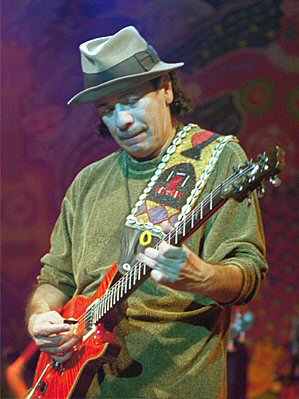- 14 3402-5578
- Rua Hygino Muzy Filho, 737, MARÍLIA - SP
- contato@latinoobservatory.org
 Wikimedia Commons
Wikimedia Commons
Carlos Augusto Santana Alves (born July 20, 1947) is an American guitarist who rose to fame in the late 1960s and early 1970s with his band Santana, which pioneered a fusion of Rock and Roll and Latin American jazz. Its sound featured his melodic, blues-based lines set against Latin American and African rhythms played on percussion instruments not generally heard in rock, such as timbales and congas. He experienced a resurgence of popularity and critical acclaim in the late 1990s. In 2015, Rolling Stone magazine listed him at No. 20 on their list of the 100 greatest guitarists. He has won 10 Grammy Awards and three Latin Grammy Awards and was inducted along with his namesake band into the Rock and Roll Hall of Fame in 1998.
Carlos Santana moved to San Francisco in the early 1960s, where he formed the Santana Blues Band in 1966. The band, later simply known as Santana, signed a contract with Columbia Records, with Santana becoming the consistent front man. Throughout the 1970s and early '80s, Santana released a string of successful albums such as Abraxas, Lotus and Amigos, making a big comeback in 1999 with the Grammy-winning Supernatural. In 2009, he received a Billboard Lifetime Achievement Award and several years later became a Kennedy Center Honors recipient. More recent albums have included Corazón and Santana IV.
The musician Carlos Santana was born on July 20, 1947, in Autlán de Navarro, Mexico. His father, Jose, was an accomplished professional violinist, and as a child Carlos learned to play the instrument from his father, though he ultimately didn't enjoy the tones he created. He would eventually take up the electric guitar, for which he developed an ardent passion.
Throughout the 1970s and early 1980s, Santana and his band released a string of successful albums in their unique style. Notable projects of this time period included Amigos (1976) and Zebop! (1981). During the 1980s, he continued to tour and record both solo and with the band, but his popularity began to decrease with commercial audiences dwindling interest in jazz/rock blends.
Nevertheless,
Santana earned critical acclaim throughout the decade, particularly for the
1987 solo album Blues for Salvador, which earned the guitarist his first Grammy
Award for Best Instrumental Performance. He toured extensively, playing in sold
out auditoriums and on tours like LiveAid (1985) and Amnesty International
(1986).
Santana left Columbia in 1991 and signed with Polydor, releasing Milagro (1992) and Sacred Fire: Live in South America (1993). Though he ended his association with Chinmoy in 1982, Santana remained intensely spiritual, especially during his live performances. In 1994, he played at the commemorative concert at Woodstock, 25 years after his band's transformative performance at the original festival. Under his own label, Guts and Grace, he released a collaborative album, Brothers (1994), with his brother Jorge Santana and nephew Carlos Hernandez, that was nominated for a Grammy for Best Rock Instrumental. Later in the decade, Santana was among the 1998 group of artists inducted into the Rock and Roll Hall of Fame.
In 2009, Santana received a Lifetime Achievement Award at the Billboard Latin Music Awards. He also debuted his own music review, Supernatural Santana: A Trip Through the Hits, at the Hard Rock Hotel and Casino in Las Vegas that same year. Santana continued to take his music on the road, playing numerous tour dates each year. In 2013, he became a recipient of the Kennedy Center Honors.
In the second decade of the new millennium, Santana continued to put forth new music as well. On his own Starfaith label, he released 2012's mostly instrumental Shape Shifter, with Corazón following two years later under RCA. The later album once again saw Santana working with Davis and featured an array of Latino artists such as Juanes, ChocQuibTown, Romeo Santos and Gloria Estefan. Spring 2016 saw the release of Santana IV, an outing that featured a return to the guitarist's textured, more psychedelic sound with bandmates from the Santana III album.
Santana lived in Marin County, California, with his wife, Deborah, whom he married in 1973, and their three children, Salvador, Stella and Angelica. On October 19, 2007, he and his wife filed for divorce, citing "irreconcilable differences."
Santana
became engaged to drummer Cindy Blackman, a member of his band who's previously
worked with Lenny Kravitz, in July 2010. The two were married in December of
that year.
Source:











